Sound Insight - Interview with Brad Divens

Like many in the music industry, Front of House Engineer Brad Divens got his start in music at a young age – joining his first band by the age of 15. Over time, his career blossomed to include working with internationally acclaimed artists, such as Mötley Crüe, Linkin Park and Cyndi Lauper. Today, he is CEO of FIXINTOGETMIXIN Inc., mixing FOH for major recording stars, such as Enrique Iglesias.
How did you get your start in the industry?
"It was 1995 and I had just moved to LA to join a band called Back Alley Gators, which had just signed a record deal. After recording the album, the label decided to not put the record out. Fast-forward to a year later and I was offered a tour management job. During the meeting with management, I was asked if I could mix. Without any hesitation, I said “yes, I can.” The rest is history!"

Can you talk more about your background and your career, including any notable/favorite projects or awards you have won for your work.
"I come from a musical background – I started playing guitar when I was 10 and I was in my first band at age 15. As a musician, I’ve recorded albums with KIX, Wrathchild America, Souls at Zero and Back Alley Gators. As a FOH engineer, I’ve worked with Garbage, Bob Seger, HIM, Jane’s Addiction, Mötley Crüe, Linkin Park and Cyndi Lauper, among others. I am currently working with Enrique Iglesias on his latest tour. I was nominated for Parnelli’s FOH Mixer of the Year in 2015 and 2017, and for Tour Link Top Dog FOH Engineer in 2015. I was also inducted into the Maryland Entertainment Hall of Fame in November 2018."
What’s the biggest project you have worked on in your career?
"Well, the biggest project would have to be maintaining my career! I’ve had the privilege to work with a lot of very talented artists. From Garbage to Bob Seger to Enrique (Iglesias), every project I’ve worked on is big to me."
How long have you been using DPA? When did you first start using DPA and why?
"I have used DPA with Enrique [Iglesias] for almost three years. I believe it was around March 2016 when I first tried the 2011C Twin Diaphragm Cardioid Microphone on a snare drum, and it’s been there ever since. When I put a DPA microphone on an instrument, I feel that I’m hearing the instrument and not the microphone. It’s a true representation of what the source sounds like."
What productions or events have you used DPA mics for? What DPA mics do you use?
"I use DPA for every show that I mix with Enrique Iglesias. Microphones that I use include the 4018VL Linear Vocal Microphone, 2011C and the 4099 Instrument Microphone."

What are some of the challenges of miking for the events you work on? How does using DPA help solve these challenges?
"There is a 40-foot thrust extending off Enrique’s main stage and also a C-stage, which sits right behind FOH. Enrique spends a lot of time out in front of the PA. The rejection and tightness of the 4018 capsule are a must in this situation – and it never fails, I never have issues with feedback. We also have two back-up vocalists, who are using 4018sright next to the percussion rig – again, the bleed is kept to a minimum. Using the 4018 capsule keeps the vocals present and the mix clean. Pure audio bliss!"
Please tell us about your working style and some technical details about your daily workflow.
"My mixing style is very musical – I approach my mix as I would a performance. I want it to be powerful, passionate, emotional and dynamic. I want to take the audience on a musical roller coaster. The first thing I do before starting my line check is to make sure the microphones are exactly where I want them to be. After the system engineer is done, I run some pink noise through the system. Next, I run some live tracks from the show and adjust the system before getting the band up on stage for a sound check. After that, I walk back on stage and check the microphones one more time just to make sure all is good."
Where do you see audio for the recording/studio/music industry going in the next five years? Do you see any major trends that will affect how you work in the future?
"Technology is constantly changing, and the lines are getting blurred between live and studio; immersive audio will be a big thing in the future. As a FOH engineer and small home studio owner, I have access to some of the same gear that many of the major studios have. Sound systems just keep getting better all the time. There is no reason not to give the audience the best experience possible."
 How to resolve AdBlock issue?
How to resolve AdBlock issue?